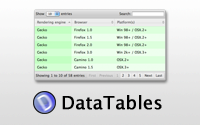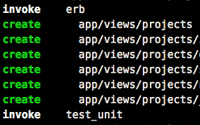Categories
- Active Record
- Active Resource
- Active Support
- Administration
- Ajax
- APIs
- Authentication
- Authorization
- Background Jobs
- Caching
- Code Walkthrough
- Controllers
- Debugging
- Deployment
- eCommerce
- Forms
- Mailing
- Models
- Performance
- Plugins
- Production
- Rack
- Rails 2.0
- Rails 2.1
- Rails 2.2
- Rails 2.3
- Rails 3.0
- Rails 3.1
- Rails 3.2
- Rails 4.0
- Refactoring
- Routing
- Search
- Security
- Testing
- Tools
- Views
Tagging
There are several gems to help implement tags in a Rails app. Here I show you how to integrate acts-as-taggable-on and then show how to do it from scratch.
(11 minutes)
Tree-Based Navigation (revised)
If your Rails app is content-heavy, consider organizing it in a tree menu structure. Here I show how to add top-level tabs, nested links in a side bar, and breadcrumbs to go up the hierarchy.
(10 minutes)
DataTables
DataTables makes it easy to convert a plain HTML table into one with pagination, sorting, and searching - all done with JavaScript and jQuery. Here I show how to set this up and use a Rails application as the data source.
(9 minutes)
Calendars (revised)
Learn how to add a calendar to your Rails app. Whether it be a date picker using jQuery UI or a full page calendar for browsing records, I will show you how to do it in this episode.
(9 minutes)
Generators in Rails 3
Generators in Rails 3 have been completely rewritten to be more modular. This allows you to customize any generator to fit your specific preferences.
(11 minutes)
Devise (revised)
Devise is one of the most popular authentication plugins for Rails. Here I show how to set it up with a User model and configure the modules, views, routes, and more.
(8 minutes)
Memcached & Dalli
Memcached is an excellent cache store, and Dalli is the best way to interact with it through Ruby. Here I show various ways to use Memcached in a Rails app including how to set it up in production.
(12 minutes)
Twitter Integration
Here I show how to integrate Twitter into a Rails app. This includes fetching data, caching it, and even how to authenticate as a user signing in to your application through Twitter.
(14 minutes)
Strong Parameters
The strong_parameters gem is an improvement over attr_accessible to securely handle mass assignment even when you have complex authorization logic. The functionality will likely be added to Rails 4 so it is a good idea to learn how it works.
(12 minutes)
Private Pub
Private Pub makes it easier than ever to publish and subscribe to real-time events in a Rails app. You can use publish_to with a block of JavaScript or supply a hash for use with JSON.
(7 minutes)










